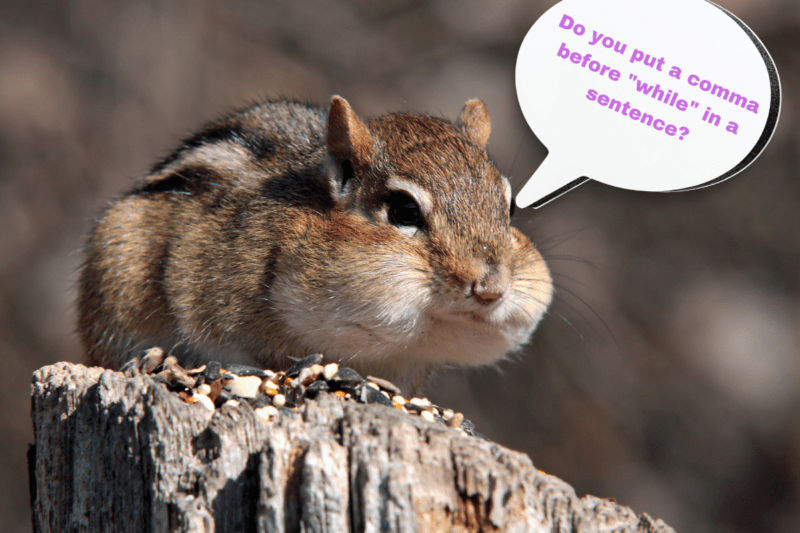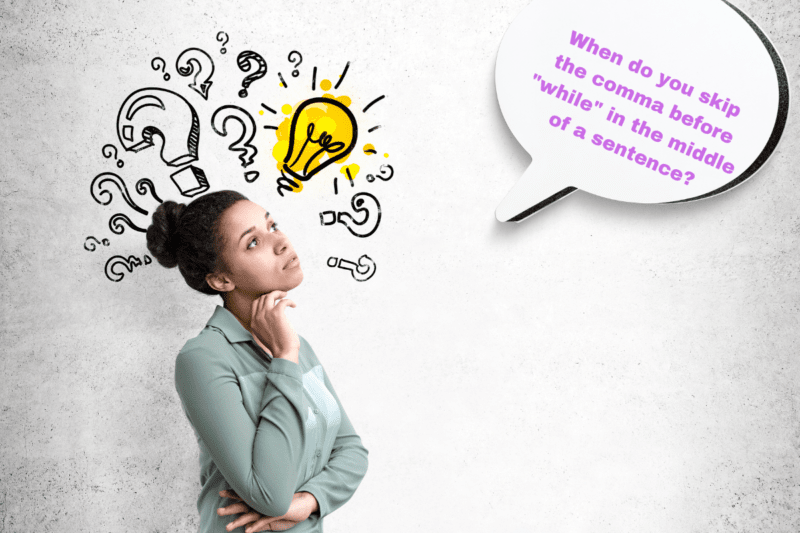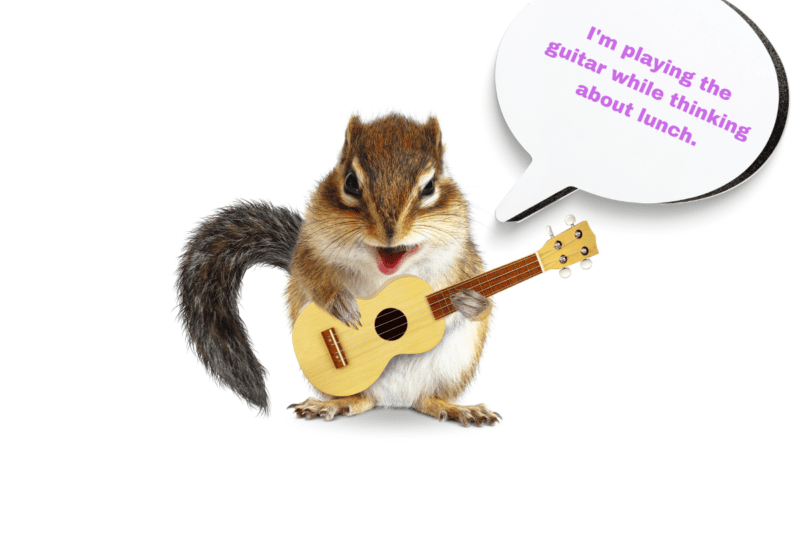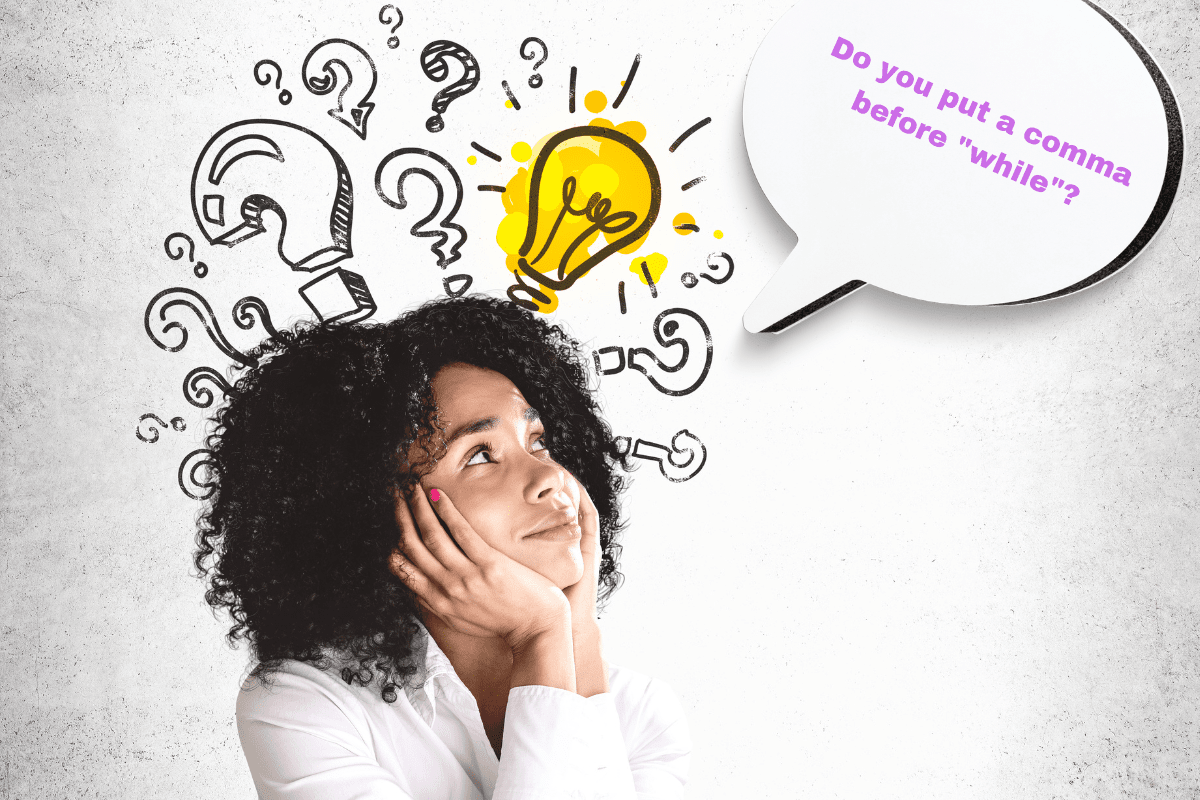Understanding when to use a comma before the word “while” can be intimidating and confusing. After all, who doesn’t want to make sure their sentences are correctly punctuated? This blog post is here to save the day: we’ll arm you with all the knowledge you need to know when it’s appropriate (and when it’s not) to include a comma before “while” in your sentence. Get your notebooks and pencils ready; we’re diving into the subject of commas and “while”!
Whether to use a comma before “while” all depends on context.
When used as a conjunction, a comma before “while” is necessary for example: The birds sang cheerfully, while I relaxed under the shade of a nearby tree.
However, when used as an adverb of time or manner, no comma is required – for instance: I sang off-key while he strummed his guitar.
Table of Contents
When to Use a Comma Before While in a Sentence

When it comes to writing, grammatical accuracy is key – but what happens when you need to use a comma before ‘while’?
A quick bit of context here: the word ‘while’ can be used as either a conjunction or an adverb. As a conjunction, it indicates that two actions are happening at the same time.
Example: “I ate dinner, while I watched TV.”
When used as an adverb, it establishes the relationship between one thing and another
Example: “She rested while I cooked.”
The general rule is simple: if while is being used as a conjunction, you have to use a comma before it. This helps to make sure the reader clearly understands what happened and when.
Example: “I cleaned my room, while my brother was playing video games.”
Here, you must use of comma before ‘while’, as that identifies that both activities are happening simultaneously.
When Not to Use a Comma Before While in the Middle of a Sentence

Generally, commas are recommended when used to introduce a phrase in the middle of a sentence. However, there are situations where this should not be done.
Avoid adding a comma before “while” when it is linking two clauses that have the same subject (ie: they have no conjunctions controlling them).
Example: “She ate her lunch while she read her book”.
Here you don’t need a comma as both clauses have the same subject and aren’t controlled by any type of conjunction.
Similarly, if you’re using the word to mean “although” or “during the same time” then you wouldn’t use a comma.
For instance, instead of writing “She ran quickly, while holding her dog.”, an appropriate way of writing this would be “She ran quickly while holding her dog.”
All in all, it’s best practice to avoid putting commas before “while”.
Do You Need a Comma Before or After “While” at the Beginning of a Sentence?

If there is an independent clause (which has no relationship to the rest of the sentence) that comes after “while,” then you should include a comma.
Example: “While I was in the store, I remembered I had left my wallet at home.”
Here the comma after “while” is correct.
However, if the two parts of the sentence are closely related and form one complete thought, then a comma usually isn’t required.
Example: “While standing in line he remembered his wallet was in his pocket.”
This sentence doesn’t require a comma.
In summary, when there is an additional statement following “while,” a comma before it is usually necessary; but if there is no second statement, you don’t need a comma.
What About a Comma Before “While” Meaning “at the Same Time”?

One of the common questions that come up when talking about punctuation is whether or not to use a comma before “while” when it carries the meaning of “at the same time”.
Well, a comma is only needed when writing a dependent clause.
This is because the comma indicates that the clause being written is subordinate to the main clause of your sentence.
Therefore, if what you are writing falls under this definition, then a comma before “while” must be used. If not, then it should not be included.
Example: While climbing the Himalayas.
This may require no commas because it’s an independent clause.
Example: “While my sister was playing a game, I fell”
This indicates that while my sister was playing a game (dependent clause) it led to the following action (me falling).
In these types of examples, the use of a comma would indeed be necessary.
What About a Comma Before “While” Meaning “Also”?

Understanding when to use a comma before “while” meaning “also” can be confusing, especially when trying to keep the quality of your writing at a high standard.
We use a comma before “while” to indicate an aside or extra detail that isn’t specifically connected to the main sentence.
In other words, you can use it to provide context or explain the relationship between two clauses of the same sentence.
However, this isn’t always necessary.
If you feel that omitting the comma would make for one cohesive sentence, then it is perfectly acceptable to do so and remain grammatically correct.
What About a Comma Before “all the while”?

When it comes to commas before “all the while,” there are a few things to consider.
First, if the phrase is used interchangeably or functions as a coordinating conjunction to connect two independent clauses, then a comma should be placed before it.
This logic follows the same rule for other conjunctions such as ‘and,’ ‘but,’ and ‘for.’
Alternatively, if the phrase follows an introductory element in a sentence, then no comma is necessary.
That being said, it’s important to bear in mind that the placement of punctuation and commas ultimately depends on the context of your sentence.
So the best way to ensure you’re using a comma correctly (or not) is to read your sentence aloud or take a look at how other people are phrasing similar ideas.
What About a Comma Before “all While”?

When writing, the decision of whether or not to use a comma before “all while” is something that routinely confuses writers.
The best approach to determine if a comma is necessary in this instance is to look at the sentence holistically.
You should use a comma before “all while” when what comes after serves as an aside to the main sentence rather than being an integral part of it.
In other words, if the portion of the sentence after “all while” would make sense to omit entirely, then a comma should be used before “all while”.
At times however, omitting the comma can make for a smoother reading experience as long as leaving it out does not substantially alter the meaning of the sentence.
Ultimately though, deciding when to include this punctuation mark requires close attention towards how each particular piece of writing flows both grammatically and stylistically.
What Do the Style Guides Say?

Style Guides such as AP Style and Chicago Style provide guidelines for writers to maintain uniformity and accuracy in their work.
One of these guidelines is the use of commas when connecting two clauses with the conjunction “while.”
In AP Style, using a comma before “while” is mandatory. However, in Chicago Style, the use of a comma before “while” is dependent on the context.
If you want to emphasize the clause, then you should use a comma.
But if not, no comma should be present.
Both styles also require commas around phrases that are non-restrictive or that set off phrases outside the main clause.
Together these basic rules can help make an article or essay more organized and cohesive.
Comma Before “While” AP Style

Knowing when to use a comma before “while” can be tricky, especially since style guides like the Associated Press Stylebook offer slightly different recommendations.
AP Style states that you should use a comma before “while” when it bonds two independent clauses.
You should use a comma if the sentence reads as follows:
Example: “I was walking down the street, while my friends were shopping at the mall.”
However, AP also says that if the clauses could stand alone as individual sentences without any changes to their structure or meaning, then they don’t need a comma between them.
Example: “While I was walking down the street my friends were shopping at the mall.”
The clause can stand on its own and therefore would not require a comma.
So if you want to adhere to AP guidelines when writing, just remember to decide whether or not those two clauses need connecting to determine if you should use a comma as well!
Comma Before “While” Chicago Style

According to the Chicago style, it is important to properly use commas before “while” to convey a clear message.
Generally accepted by the Chicago Manual of Style for American English, the correct punctuation for this usage is to add a comma before “while.”
This ensures that the sentence or phrase remains correctly structured and allows readers to understand the connection easily.
It also helps disambiguate between two clauses or phrases that occur with similar words.
Example: “Cover crops help farmers while no-till does not.”
The comma before “while” allows readers to understand exactly how the two conditions are related – without such a helpful punctuation mark, it could be interpreted as an “either/or” condition instead of an additive one.
Misconceptions or Errors People Make When Using Commas Before or After “While” in a Sentence
Many people mistakenly believe that a comma must always be used either before or after the word “while” in a sentence.
The truth is that this is not necessarily the case.
While it can sometimes make sense to use a comma, particularly when clarifying the meaning of a sentence, proper comma usage largely depends on the context.
For instance, if you are beginning a clause with “while,” then you generally would not need to include a comma.
On the other hand, if you are using it as part of an independent clause, then including one might be appropriate.
All in all, there’s no hard-and-fast rule for when to put commas before and after “while”; instead, it’s more of an art form that requires careful consideration of syntax and style.
Examples of How the Use of a Comma Before or After “While” Can Affect the Meaning of a Sentence

Understanding the basic rules for commas is something many of us are familiar with.
But when it comes to how a comma before or after “while” can affect the meaning of a sentence, even experienced writers can be challenged.
For example, if you wanted to say that you had finished eating dinner while your sister was still eating, you would place a comma before the word ‘while’.
However, if you wanted to convey the idea that you both ate dinner together all the while talking and laughing, then no comma should be used in this situation.
Who knew commas could be so confusing? It is crucial to understand these subtle yet powerful differences in our writing to ensure that we always get our point across without misunderstanding or confusion.
Example: “While we were hiking, we saw a bear” vs. “While we were hiking we saw a bear.”
In the first sentence, a comma before “while” suggests that the sighting of the bear was incidental to the act of hiking. In the second sentence, without a comma, the bear sighting becomes a more integral part of the hiking experience.
Example: “While I was cooking, the dog was barking” vs. “While I was cooking the dog was barking.”
In the first sentence, the implication is that the dog was barking at something unrelated to the cooking, while in the second sentence, the dog was barking because of something that happened during the cooking.
Example: “While he was in France, he visited the Eiffel Tower” vs. “While he was in France he visited the Eiffel Tower.”
In the first sentence, the comma suggests that the Eiffel Tower was just one of many things the person did while in France. In the second sentence, the phrase “While he was in France” becomes more closely associated with visiting the Eiffel Tower.
Conclusion
To sum up, it’s important to understand exactly when you should and shouldn’t use a comma before “while” in a sentence.
While the general rule of thumb is that you do not need to use a comma before “while,” there are certain contexts where one may be necessary.
Additionally, other variations of the word such as all the while, also, at the same time, and all while may require different punctuation rules.
To ensure accuracy in your writing, it is wise to reference style guides such as AP Style or Chicago Style for specific guidelines on using commas with each of these words.

